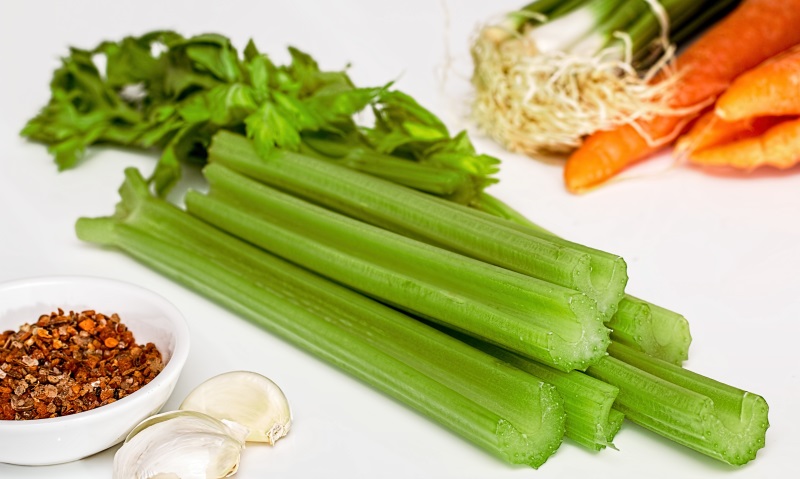We read about some women surviving by eating celery sticks. But is celery actually that good for your health? Or is it all hype and hoopla around a regular vegetable? Let’s find out.
Having the scientific name Apium graveolens, celery belongs to the Apiaceae plant family. Celery has a long stalk that is hairy, and based on its variety, its stalk, leaves, or hypocotyl is used in cooking and consumed. Plus, celery seed is used as a spice, with its extracts being used in medicines.
Suggested read: All you need to know about the numerous health benefits of figs
History of celery

Image source: Google, copyright-free image under Creative Commons License
Celery has been around since forever, like, literally! It’s an old vegetable; archaeologists have found evidence of this vegetable in the tomb of the renowned pharaoh King Tutankhamun, who died way back in 1323BC. Celery leaves were apparently used as garlands for the dead, while also using them to make wreaths and crowns to present to winners of battles too in ancient Greece. Celery is mentioned in Homer’s Iliad too, where the Myrmidons’ horses graze on wild celery grown in the marshes of Troy.
Why use celery
Celery is an excellent source of powerful antioxidants and enzymes, along with other vital nutrients like vitamin K, vitamin C, vitamin B6, folate, and potassium. Celery has been used as an anti-hypertensive agent in folk medicine for ages now, and it provides numerous other cardiovascular benefits. Recent studies have also indicated that celery has both antioxidant and anti-inflammatory properties, both of which help keep blood pressure and cholesterol levels balanced.
Celery is a low-calorie, high-fiber food, which boosts digestion and weight loss. Plus, celery contains a very high percentage of water, along with electrolytes, which makes it excellent for preventing dehydration. Celery contains polyphenol phytonutrients and antioxidant flavonoids, which help improve your skin, promote healthy liver and eye, along with boosting cognitive health.
Nutritional facts of celery

Image source: Google, copyright-free image under Creative Commons License
Celery is most commonly consumed for its stalks, although its leaves and seeds are edible too. 100g of celery provides 12kcal of energy, along with:
- 9g of carbohydrates
- 4g of natural sugars
- 8g of dietary fiber
- 17g of fat
- 69g of protein
- 95g of water
- Vitamin K – 28% of daily value
- Folate – 9% of daily value
- Vitamin B6 – 6% of daily value
- Vitamin B2 – 5% of daily value
- Vitamin C – 4% of daily value
- Vitamin A – 3% of daily value
- Vitamin B1 – 2% of daily value
- Vitamin B3 – 2% of daily value
- Vitamin E – 2% of daily value
- Potassium – 6% of daily value
- Sodium – 5% of daily value
- Calcium – 4% of daily value
- Magnesium – 3% of daily value
- Phosphorus – 3% of daily value
- Iron – 2% of daily value
- Zinc – 1% of daily value
Health benefits of celery
Let’s take a look at some of the most important health benefits of celery.
1. Celery helps lower inflammation.
Celery is rich in antioxidants like flavonoids and polyphenols, which are known to act as anti-inflammatories. Although they help improve overall health, they are particularly impressive in fighting oxidative stress caused by free radicals, that can lead to inflammation if it goes unchecked. Inflammation is an underlying factor for many chronic diseases like cancer, arthritis, heart disease, to name a few. These same flavonoids and polyphenols are also helpful in treating a number of other health conditions that are worsened by inflammation, like gout, kidney and liver functions, joint pain, irritable bowel syndrome, skin disorders, and urinary tract infections, among others.
Suggested read: All you need to know about the numerous health benefits of ginger
2. Celery helps treat/prevent high blood pressure.
As mentioned above, celery has been known to possess anti-hypertensive properties, which are essential in lowering high blood pressure. And high blood pressure is a major risk factor for coronary heart disease. Celery, particularly its seeds, have the capacity to lower blood pressure levels, while also helping lower inflammation and improve circulation. Celery is known to help reduce high blood pressure by acting as a muscle relaxant, while also improving the flow of minerals like potassium and calcium in and out of cells.
3. Celery helps lower high cholesterol.
High cholesterol levels are a major risk factor for coronary heart disease, and celery is excellent in helping lower cholesterol levels due to the presence of a unique compound. Celery also possesses excellent lipid-lowering capabilities as well, which is beneficial for your overall health.
4. Celery prevents ulcers.
Ulcers are painful, especially ones that form in the digestive tract. And celery has excellent properties that help prevent painful ulcers from forming in the lining of the digestive tract. How celery protects the lining of the digestive tract is by helping replenish the depleted levels of gastric mucus, which prevents tiny holes and openings from forming. Also, celery is known to nourish the colon, intestines, and the stomach, through the presence of tannins, flavonoids, and alkaloids that help control the gastric acid levels.
5. Celery boosts digestion and helps lower bloating.
Celery possesses diuretic effect, which helps the body to detox. This improves circulation within the intestines, thereby aiding in improving digestion by helping relieve bloating, flatulence, and puffiness due to water retention.
6. Celery protects liver health.
Celery can be beneficial in reducing the amount of fat buildup in the liver, which can be dangerous in the long run. So celery protects liver health.
7. Celery fights infections.
Celery possesses anti-bacterial properties, which act against harmful bacteria that cause infection. The celery extract can significantly purify and lower the bacteria’s growth, thereby boosting immunity and help fight bacterial infections.
8. Celery helps prevent urinary tract infections.
Celery is known to help lower uric acid and also stimulate urine production, which is why it’s super beneficial in fighting bacterial infections within the digestive tract and reproductive organs. So celery helps prevent urinary tract infections, as well as bladder disorders and kidney problems.
9. Celery may help protect against cancer.

Image source: Google, copyright-free image under Creative Commons License
Celery contains chemo-protective compounds called polyacetylenes, which are known to help lower toxicity and fight against cancer formation, in particular, leukemia, breast cancer, and intestinal cancer. These compounds are known to boost immune system, along with possessing tumor-fighting capabilities that stop mutated cells from multiplying.
10. Celery helps in weight loss.

Image source: Shutterstock
Since celery is a low-calorie, high-fiber food, it’s valuable in helping you lose weight, because it can provide essential nutrients within a few calories, while also helping regulate fat metabolism. With very few calories, celery can provide a bunch of vital nutrients like electrolytes, antioxidants, vitamin C, B vitamins, and potassium. And when you have all the nutrients you need in one food, you don’t crave unhealthy snacks and avoid overeating too.
11. Celery reduces asthma symptoms.
Vitamin C is an antioxidant, and it helps prevent free radical damage in the cells. Plus, its anti-inflammatory properties help reduce the severity of inflammatory conditions like asthma.
12. Celery provides relief from migraine headaches.
Celery contains a compound called coumarin, which is known to help provide relief from migraines and headaches too.
13. Celery helps manage diabetes symptoms.
Celery leaves are rich in fiber, which has been shown to help in managing diabetes symptoms.
14. Celery promotes healthy skin.

Image source: Google, copyright-free image under Creative Commons License
Celery is rich in antioxidants that help fight free radical damage to skin cells through oxidative stress. Therefore, if you want healthy, glowing skin, celery is your food.
15. Celery promotes eye health.
Celery is rich in vitamin A, which is also essential for healthy eyes. Therefore, celery promotes eye health, while also helping prevent age-related degeneration of eyesight.
16. Celery could boost your libido.
Celery contains two compounds called androstenone and androstenol, both of which are associated with sexual arousal, and they are released when chewed on a celery stalk. Therefore, celery could possibly boost your libido, helping improve your sex life.
Suggested read: All you need to know about the numerous health benefits of cashew nuts
How best to consume celery
Celery is usually eaten raw in salads and soups. Chop celery leaves, add fresh vegetables or meat of your choice, and simple salad dressing ought to do the trick. Celery stalks and/or leaves can be used in fruit salads too. Chop all the fruits you want in a bowl, along with some raisins and peanuts, and top it with a mayonnaise.
Celery seeds contain volatile oils, linoleic acid, and coumarins, which might not be good for pregnant women’s health. So if you’re with child, you’d best avoid celery altogether. Else, you can munch on any amount of these crunchy, green stalks.
These are all the numerous health benefits of celery. Being nutrient-dense and low in calories, celery is one of the best foods out there for your overall health. The next time you go grocery shopping, don’t forget to put these in our basket!
Featured image source: Google, copyright-free image under Creative Commons License













